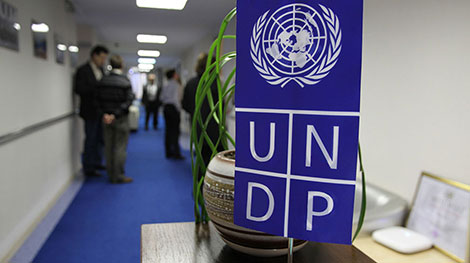Business news
UNDP’s three-year-long project to develop entrepreneurship in Belarusian towns over

Photo courtesy of the UNDP
MINSK, 6 May (BelTA) – Over 3,000 people have taken part in events of the project “Promotion of employment and self-employment of the population in small and medium-sized towns in the Republic of Belarus” (Small Towns). The UNDP and the Belarusian Economy Ministry implemented the project for three years with financial assistance of the Russian Federation. Created thanks to the project’s funding, the infrastructure continues developing small business in Mogilev Oblast and Vitebsk Oblast, BelTA learned from the project’s PR specialist Dmitry Novik.
For the sake of economic development of small towns it is important to prevent working-age population from leaving small towns for larger population centers. As of the project’s launch in 2017 the share of small and medium businesses in the total state budget revenues in Belarus stood at 24.9%. The figure varied from 10% to 20% in the districts selected for implementing the project.
In order to improve these figures, infrastructure to support small and medium business was created in six towns in Mogilev Oblast and Vitebsk Oblast: Krichev, Mstislavl, Chausy, Gorky, Baran, and Glubokoye. According to Belarusian Deputy Economy Minister and the national coordinator of the Small Towns project Dmitry Matusevich, the decision was prompted by the desire to support entrepreneurs in the regions and give them the opportunities available to residents of major cities where most of the entrepreneurship support centers are located.
Dmitry Matusevich noted: “We expected the measure to increase the number of small and medium businesses in these regions. We went ahead with the experiment and witnessed the emergence of hybrid forms of entrepreneurship support. For instance, entrepreneurship support centers decided to also offer business incubation services or integrate a business incubator into a technological cluster. I am convinced that such a promising SME support infrastructure unit will be developed in Belarus in the near future.”
Specialists with small business development expertise are working at all the created platforms now: they provide consultations, help put together business plans, and help find profitable sources of finance. Some entrepreneurship support centers even rent out furnished office premises at preferential rates. Over the course of their operation the entrepreneurship support centers have given over 1,100 free consultations and have helped create 58 new commercial entities.
Peculiarities of the region were taken into account for every support center that has been established. For instance, work in Mstislavl is geared towards exploring the tourism potential of the region and towards encouraging the locals to offer their services to visitors. An official presentation of an interactive tour took place in 2019. As part of the interactive tour tourists are invited to attend workshops, food samplings, and theatricalized shows arranged by local entrepreneurs and craftsmen. Based on a technological cluster in Gorki, the business incubator cleverly exploited demographic peculiarities of the region. Modern coworking space has been set up in the very center of the campus of the local agricultural academy. Business education events and programs for startups are regularly organized there now. Students’ interest in the work of the business incubator has a ripple effect: after finishing their studies residents of the business incubator will be able to utilize the knowledge they have acquired and implement their ideas in their native towns.
Since 2017 over 110 free educational events have been held in cities and towns in Vitebsk Oblast and Mogilev Oblast as well as the city of Minsk, with entrepreneurs from all parts of the country taking part in them. Over 3,000 people were taught basic entrepreneurship, marketing, franchising, and small business financing in the regions. Business education events targeting potential businesswomen and helping overcome internal barriers and stereotypes concerning female entrepreneurship attracted considerable interest.
The Small Towns project supervisor Marina Kalinovskaya stressed: “Polls indicate that over half of the participants were motivated to create a business of their own while 22% of those polled have started launching a business or have already launched one after attending our education events. Apart from that, special textbooks on basic entrepreneurship, franchising, and clusters in the regions were worked out as part of the project. The books can be acquired for free in all the six entrepreneurship support centers. They are also available in digital format on the UNDP website.”
Free education will remain available even after the project is finished thanks to efforts of the business incubators, which had received educational equipment, including equipment for remote education. The Mstislavl-based entrepreneurship support center went online early on: at present its website offers free access to a series of videos on ways to increase retail sales. Educational materials will be created later on depending on what the entrepreneurship community may need.
Over the course of three years the Small Towns project has managed to enable productive cooperation between the state, not-for-profit organizations, and the business community of Belarus. According to UNDP Resident Representative in Belarus Alexandra Solovieva, the project helped businessmen in the regions find new partners and expand their presence on the Belarusian market and the Russian one. “During educational trips and internships entrepreneurs and representatives of municipal authorities signed agreements on cooperation, sale contracts, and established sister city relations between Belarusian and Russian cities. Thanks to proximity to Russia entrepreneurs of Mogilev Oblast and Vitebsk Oblast were granted additional opportunities to grow their businesses,” Alexandra Solovieva said.
The project’s overall budget was close to $1.2 million. Additional funding was granted by the Development Bank of the Republic of Belarus (DBRB), with which the UNDP had signed a cooperation memorandum. The bank granted a total of $5.8 million for 140 projects of small and medium businesses in Vitebsk Oblast and Mogilev Oblast in 2018-2019 as part of the jointly developed loan program to support the regions and female entrepreneurship.







 print version
print version make home page
make home page add to bookmarks
add to bookmarks

